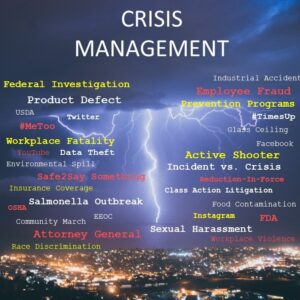Is Your Business Ready For A Crisis?

Crisis situations often have unforeseen results that could jeopardize the critical assets, reputation and financial standing of a business enterprise. Crisis management is defined as a series of steps performed by an organization to deal with catastrophic events. Statistics show that 59% of businesses have experienced a crisis, but only 54% of businesses have a plan in place to deal with such events. Research suggests that businesses are at risk of losing 22% their business when potential customers find just one negative article on the pages of their search results.
Frank C. Botta recently presented the following key crisis measures for consideration at a seminar held by the Firm on May 3 and May 4, 2019. The Lynch Law Group helps clients prepare to lead and navigate so they are best able to anticipate and react with confidence.
Let us assist you in (1) Preparing (2) Responding and (3) Recovering from any crisis.
1. Preparedness Programs: Is your company ready for a crisis?
2. Proactive Measures
- Policies
- Procedures
- Administrative Controls and Training
- Develop a Comprehensive “All Hazards” Evacuation Plan
- Insurance Coverage:
- Company should incorporate any workplace violence, including active shootings, into the same plan they have been using for other emergencies, such as fire, chemical spills, gas leaks and natural disasters such as tornadoes or hurricanes.
- Crisis Committee/Safety Committee to address heightened crisis situations
- Training and evaluation planning (Prescreening of applicants/vendors).
- Employee Assistance Programs (EAP)
- Employees must feel empowered to report suspicious behaviors within the chain of command or through a hotline process.
- Assess current physical security measures and potential vulnerabilities such as door access controls, security cameras, lighting for exterior areas, alarms, locks and fencing.
- Internal and external communications plan in place to counter the incident. The first 24 hours are critical because the early stages of a crisis shape the proper response.
- Consider stress management, conflict resolution and first aid as part of your crisis assessment.
- Multidisciplinary Human Impact Team trained and prepared to specialize in the human side of crisis response (next-of-kin notification procedures).
- Well thought out crisis communication to and from affected stakeholders, including hotline capabilities.
- Threat Response Team in place to plan to investigate, assess and defuse threatening situations. The team should include members of management and include backups.
- Core Team: At a minimum include managers from company Security, Human Resources and Legal.
- Additional Resources: Internal managers, police officers, threat consultants, private investigators, forensic specialist, linguistic analyst, profile specialist, guard services, mental health professionals, employment attorney, surveillance specialist, undercover investigator, IT specialist, and polygraph examiner.
Employer’s Legal Obligation
(Occupational Safety and Health Act of 1970)
- To keep its workplace free from recognized hazards likely to cause death or serious physical harm to its employees for which feasible means of abatement existed. See Section 5(a)(1) (a/k/a: General Duty Clause)
- Duty to comply with specific health and safety standards promulgated by Congress, imposed on an employer, was its duty to comply with specific health and safety standards promulgated by OSHA.
*OSHRC upheld a decision of an ALJ; (Administrative Law Judge Dennis L. Phillips) which affirmed the citation issued against a healthcare company after a worker was stabbed to death by a patient.
- $10,500 in penalties
- Case decided March 4, 2019
- Dept. of Labor v. Integra Health Management, Inc.
Legal Take-Aways:
- Crisis situations can be addressed through proactive preventive planning.
- Do not believe that “it will never happen to me/us”.
- Have you reviewed your insurance policies (representations and warranty) to determine if you are covered for such unexpected crisis?
- Understand and react differently to an incident vs. a crisis.
- Care and caution must be given in providing a response to a crisis situation which may bind the company criminally/civilly. A particular response can be harmful towards any defenses or legal challenges that may be raised to protect the company from liability, penalties or fines.
- Consideration for all documents, emails and requests for information to be channeled through legal counsel to be preserved and protected under the attorney—client privilege doctrine.
Pittsburgh Corporate Attorneys
Frank Botta advises companies in all industries with regard to preparing for and responding to a crisis situation. Please contact Frank at (724) 776-8000 or fbotta@lynchlaw-group.com for more information on this topic.





